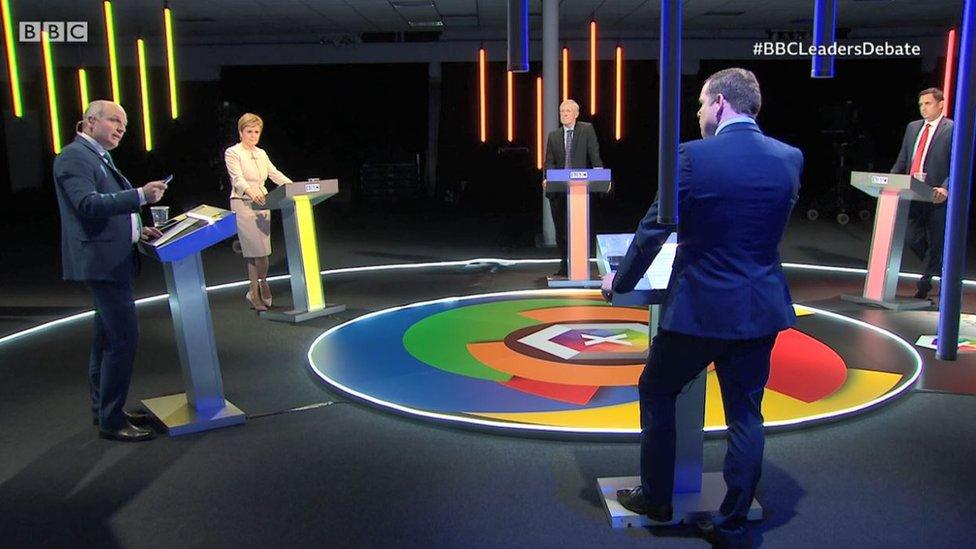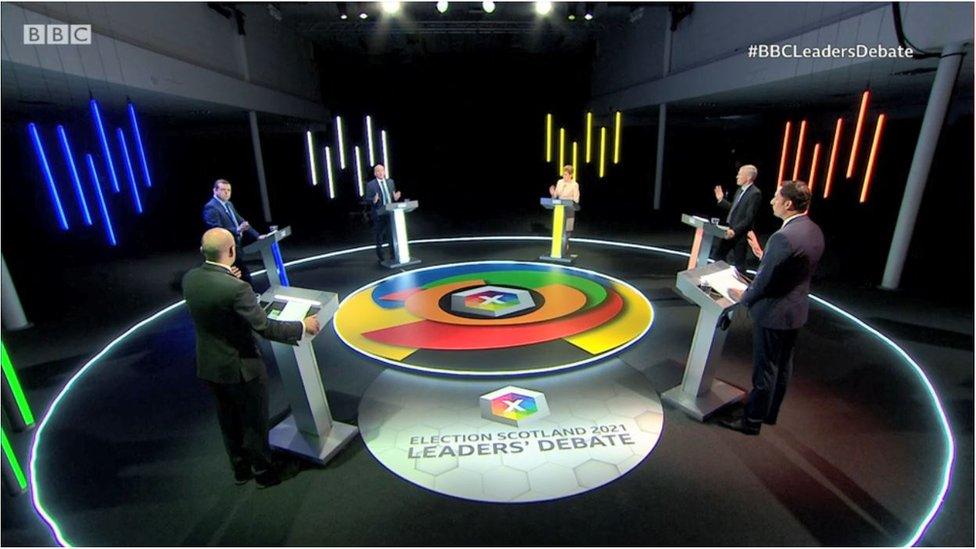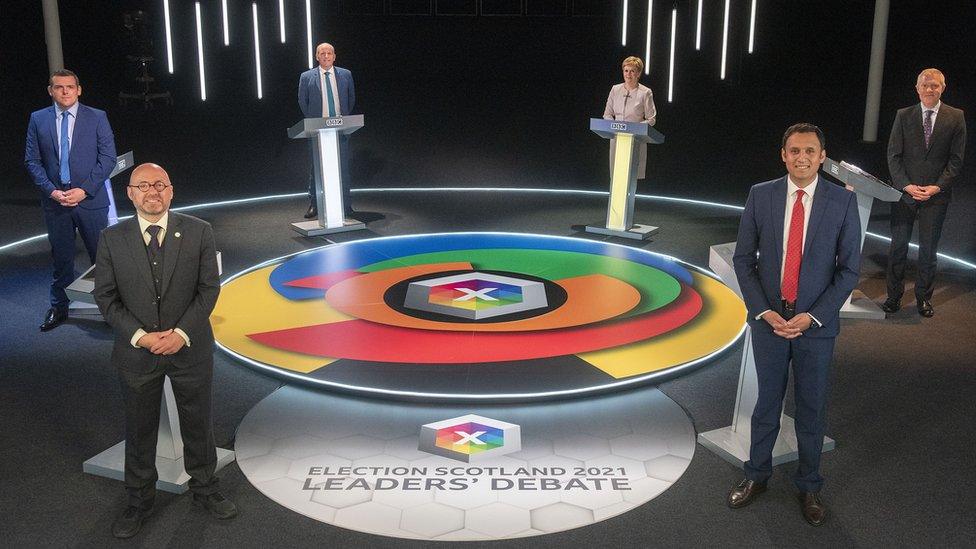Scottish election 2021: Five takeaways from the final debate
- Published

With only hours left to polling day, the leaders of Scotland's biggest political parties have made their final pitch to the nation in a BBC TV debate. What were the key takeaways from the last big set-piece of the Holyrood campaign?

1. The parties actually have a lot in common
The striking thing about the early stages of this debate was that when you get away from the constitutional faultlines, these parties actually have a lot in common.
The leaders all broadly agreed about taking a cautious route out of the Covid-19 lockdown, and all seem to be planning a "staycation" this year rather than international travel.
All want to commit more money to health and care services - and none of them want to raise income taxes to do it.
They are still politicians, so there were digs aplenty, but there were also lots of "I agree with..." moments - even between Patrick Harvie and Douglas Ross, who are not usually exactly chummy.
So there is plenty of common ground between the parties - but it tends to be forgotten when the debate swings to independence, and that was predictably the section where the "no talking over each other" rule went out the window.
2. The row over indyref2 mandates has already begun
While not a single vote has yet been counted, parties are already on manoeuvres for the debate likely to follow the election - of what constitutes a mandate for a fresh independence referendum.
Much was made of a tweet from the Scottish Conservative account which said an SNP majority would "guarantee" that referendum - despite the fact the party is opposed to it.
Mr Ross had to backpedal somewhat to insist this was because Ms Sturgeon would hold an illicit "wildcat" vote - something she has always denied she would do - but he may be quietly satisfied that people are engaging with the idea of an outright majority being the trigger.
This is a higher bar than is set by the SNP manifesto, and indeed that of the Greens - they both argue that a simple pro-independence majority would be enough to justify a referendum after the immediate crisis has passed.
Labour, meanwhile, has been largely shut out of the constitutional debate in recent years, without a clear policy - and Anas Sarwar's position of attacking both the SNP and Tory positions in a bid to drum up interest in "something different" is likely to be one which continues post-election too.
And Scottish Liberal Democrat leader Willie Rennie said people would be "bemused" that the leaders were debating independence in the wake of a global pandemic.
Allow X content?
This article contains content provided by X. We ask for your permission before anything is loaded, as they may be using cookies and other technologies. You may want to read X’s cookie policy, external and privacy policy, external before accepting. To view this content choose ‘accept and continue’.

SIGN UP FOR SCOTLAND ALERTS: Get extra updates on BBC election coverage

3. Covid-19 is a political issue
The pandemic has never been very far from the election campaign, being the central issue dominating the lives of the electorate.
But the focus has for the most part been on competing visions of recovery - parties have maintained at least a pretence that things like decisions over restrictions and televised briefings are elevated above the realm of grubby politicking.
That is, until this week. The final days of the campaign have seen the SNP roll out an advert co-opting the imagery of the non-partisan briefings and Chancellor Rishi Sunak wade in with a "broad shoulders of the Union" argument warning against independence.
The debate rather continued this theme. Ms Sturgeon noted that there is a review point next week, and that people should vote for her party if they want her to be back behind the lectern making the decisions.
Allow X content?
This article contains content provided by X. We ask for your permission before anything is loaded, as they may be using cookies and other technologies. You may want to read X’s cookie policy, external and privacy policy, external before accepting. To view this content choose ‘accept and continue’.
She also faced criticism over her handling of the pandemic, with Mr Sarwar accusing the government of lacking "common sense" by sending Covid-positive patients from hospitals into care homes.
It is notable that the issue of the pandemic and independence are becoming more and more intertwined.
The pro-UK parties argue that a debate over the constitutional future of the nation would distract from the work of rebuilding Scotland in the wake of the health and economic crisis.
They each have a different way of spinning it - Willie Rennie actually mixes in another constitutional issue by saying Scots should not "repeat the mistakes of Brexit" with independence - but the message is broadly the same, recovery before referendum.
However as we saw in the debate, the pro-independence parties link also referendum and recovery, but in completely the opposite way. Both Nicola Sturgeon and Patrick Harvie stressed that independence could be a key part of the rebuilding effort - and this again is a debate which will continue long after the election is over.

What are the parties promising you?

Use our concise manifesto guide to compare where the parties stand on key issues like Covid-19, independence and the environment.

4. Parties are much happier talking about spending money than raising it
The pandemic has seen the public spending taps turned on to an unprecedented degree, with Holyrood's budget swelling to pay for the various relief schemes required over the past year.
All of the parties participating in the debate have ambitious spending plans for the years ahead, but have rather less in the way of immediate plans to raise extra funds.
To be clear they are not suggesting giveaways for the sake of it - but big, transformational policies like universal basic income schemes and National Care Services ultimately have to be paid for. Realistically, most will accept there will have to be trade-offs.
The five leaders on the stage each raised their hand to agree that they would not raise income tax in the immediacy. There are differences in what they might like to do later on, towards the end of the next parliamentary term, but for now the word they all use is "stability".
There are some other ideas on taxation, like Labour's proposal to rinse more cash from online giants or the Green policy of a wealth tax on millionaires - but for the most part parties are far more comfortable talking about spending money than raising it.
The Institute for Fiscal Studies has been critical of some of the parties' manifestos, saying that what they have in common is "a disconnect from the fiscal reality, external the next Scottish government is likely to face".
More detail and fiscal transparency will be required in the early part of the coming parliament if some of the more ambitious pledges outlined are to be delivered on.

All of the party leaders put their hand up to accept they were not immediately proposing any income tax rises
5. Familiar messages to the fore
While this debate focused on some topics which have not featured as prominently in the other big set-pieces - such as the idea of a National Care Service and tax policies - leaders were still keen to get their key messages and slogans across.
Nicola Sturgeon stressed her pandemic leadership, and was the first leader to bring up Boris Johnson - her favourite punching bag. She also underlined that she wants to offer an independence referendum only after the immediate threat of the pandemic has passed - a key caveat in the tricky balance of winning over wavering voters as well as the SNP's core support.
Douglas Ross was combative over independence, repeating the Tory mantra that only they have the strength to stop an SNP majority and thus indyref2 - pointing the finger at Anas Sarwar in the process.
Mr Sarwar repeated his plea for people to move on from the constitutional divide, in a bid to paint Labour as a credible third option away from the SNP-Tory scrap over independence.
Patrick Harvie continued to position the Greens as the "other" pro-independence party, but also one with different, often more radical policies to the SNP - promising that they could make the difference not just over the constitutional question, but in pushing the government to go further on other topics, including climate change.
And Willlie Rennie battered away at his favourite topics, education and mental health, while comparing independence to Brexit - all key elements in his strategy to differentiate the Lib Dems from the other pro-UK parties.

POLICIES: Who should I vote for?
CANDIDATES: Who can I vote for in my area?
PODLITICAL: Updates from the campaign

- Published4 May 2021
